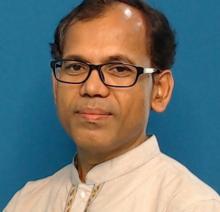Lecture by Md. Mahmudul Hasan, Professor, Department of English Language and Literature at International Islamic University Malaysia (IIUM)
Event moderated by Elora Shehabuddin, Professor of Gender & Women’s Studies and Global Studies; Director, Subir and Malini Chowdhury Center for Bangladesh Studies, UC Berkeley
_______________
- DATE: Tuesday, Sept 12, 2023
- TIME: 9am Berkeley | 10 pm Dhaka | Calculate your local time
- ZOOM: Register HERE
_______________
ABSTRACT: Humayun Kabir (1906–69) is one of three notable creative writers who were born in what is now Bangladesh and wrote in English during the British colonial rule of the Indian subcontinent, the other two being Madhusudan Dutt (1824–73) and Rokeya Sakhawat Hossain (1880–1932). They chose both English and Bangla as mediums of creative writing, a choice which tells us about their desire for global reach and strong moorings in local traditions. Among all Bangladeshi writers in English, Kabir was arguably the most cosmopolitan and widely travelled. Despite his international stature and sophistication, he was not delinked from the continuum of the lifeworld of his birthplace. In this presentation, I will present his Men and Rivers (1905) as a testament to his strong sense of belonging to his society and culture of origin. I will interpret the novel as a celebration of rural life and fascinating aspects of Bangladesh’s social norms. This presentation will illustrate how, during the colonial period, villagers in remote areas maintained their pristine traditional ways unaffected by imperial dominance in (semi)urban centres. In writing the novel, Kabir clearly had in mind the need to reach an international audience beyond the bounds of rural communities and to inform it about cultural practices and modes of behaviour of a people who are not adequately represented in literature. This paper can be a window for urbanites, non-Bangladeshis into a world that is very much Bangladeshi, Muslim, and rural.
SPEAKER BIO: Md. Mahmudul Hasan is with the Department of English Language and Literature at International Islamic University Malaysia (IIUM). Since completing his PhD in comparative literature at Portsmouth (UK), he has taught at the University of Dhaka and IIUM in addition to doing a postdoctoral stint at Heidelberg in Germany. Hasan has published in the fields of feminist, postcolonial, South Asian, and Muslim diasporic literatures with presses such as the Asiatic Society of Bangladesh, Brill, Orient BlackSwan, Routledge, SAGE, Wiley-Blackwell, and others. He was involved in editing two journal special issues and two edited volumes on Bangladeshi literature in English. He is the author of Islamic Perspectives on Twentieth-Century English Literature (2017). His coedited books include Bangladeshi Literature in English: A Critical Anthology (2021), A Feminist Foremother: Critical Essays on Rokeya Sakhawat Hossain (2017), and Displaced & Forgotten (2017) that contains memoirs of refugees from Afghanistan, Myanmar, Palestine, Somalia, and Syria as well as interviews with those from Cambodia, Kashmir, and Syria. One of his co-edited books on Bangladeshi literature in English is forthcoming with Routledge. He has supervised five PhDs and eight masters dissertations to completion so far. Hasan is the Editor-in-Chief of the Scopus-indexed journal Asiatic.
_____________
Established in 2013 with a generous gift from the Subir & Malini Chowdhury Foundation, The Subir & Malini Chowdhury Center for Bangladesh Studies at UC Berkeley champions the study of Bangladesh’s cultures, peoples and history. The first of its kind in the US, the Center’s mission is to create an innovative model combining research, scholarships, the promotion of art and culture, and the building of ties between institutions in Bangladesh and the University of California.
Like us on FACEBOOK
For DIRECTIONS to the Institute please enter “Institute for South Asia Studies” in your google maps or click this GOOGLE MAPS LINK.
PARKING INFORMATION
Please note that parking is not always easily available in Berkeley. Take public transportation if possible or arrive early to secure your spot.
Event is FREE and OPEN to the public.

